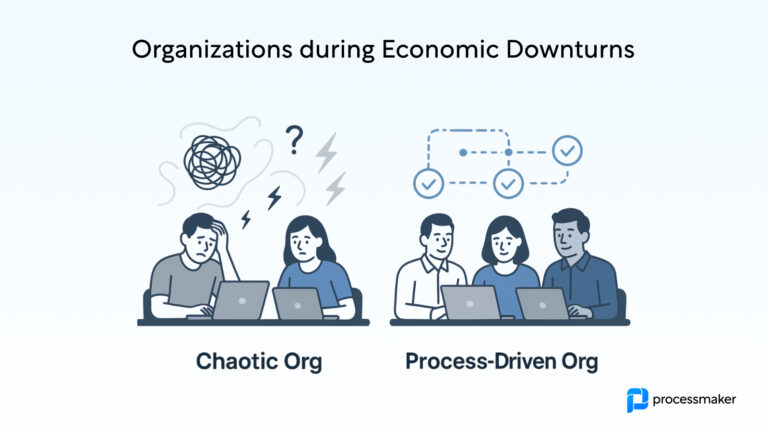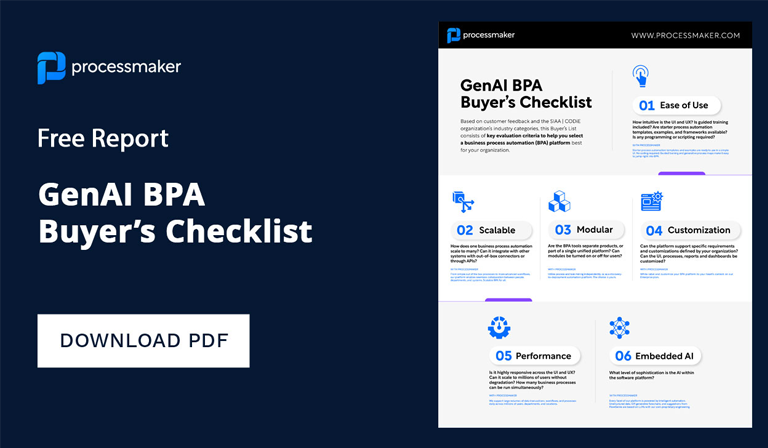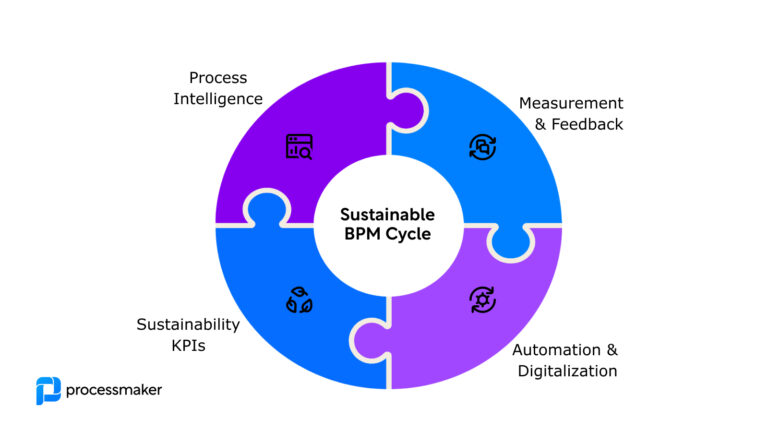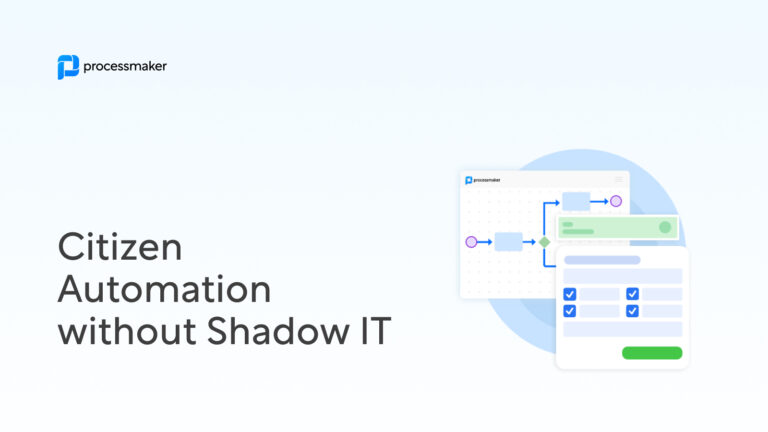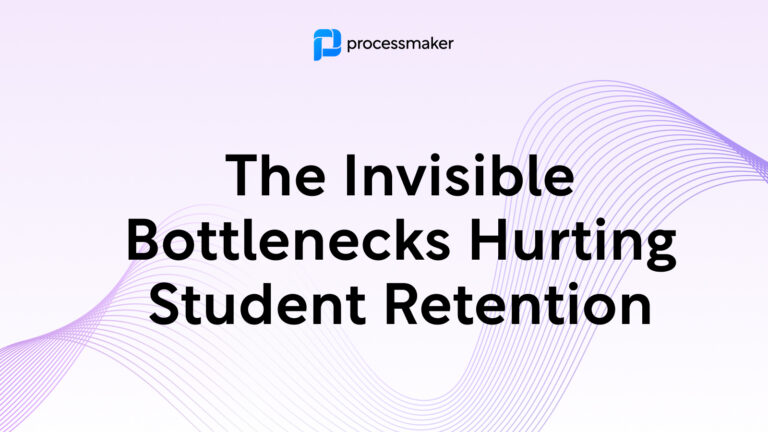When markets tighten, leaders search for proven strategies to survive economic downturns. While many organizations resort to drastic cuts, process-oriented companies consistently outperform during recessions. Their focus on lean operations, process efficiency, and disciplined execution enables them not only to endure downturns but to accelerate growth when recovery begins.
Platforms like ProcessMaker, which specialize in intelligent process orchestration, make it possible for organizations to embed process discipline at scale, delivering both efficiency and agility when it matters most.
Why Process-Driven Organizations Survive and Thrive
Companies built on process excellence have a structural advantage in times of uncertainty. By embedding operational efficiency and lean practices into their DNA, they create resilience that ad hoc or reactionary organizations cannot replicate.
Key advantages include:
- Reduced waste and lower costs: Streamlined workflows minimize inefficiency, freeing up capital to invest strategically. With ProcessMaker, repetitive manual tasks can be automated, lowering costs and reducing errors.
- Faster, smarter decision-making: Standardized processes create clarity, enabling leadership to respond quickly to market shifts. ProcessMaker’s workflow automation ensures decision paths are consistent and transparent.
- Predictability and stability: Documented, repeatable processes reduce variability, which is critical for planning during downturns.
These capabilities allow process-oriented companies to protect margins, continue funding critical innovation, and gain ground while competitors pull back.
Operational Visibility in Times of Uncertainty
One of the biggest risks during a recession is flying blind. Companies without strong processes often lack real-time visibility into costs, resources, and performance.
By contrast, process-driven organizations:
- Track work end-to-end, enabling data-driven resource allocation.
- Use metrics and KPIs to identify bottlenecks and cut precisely where needed.
- Adapt quickly by adjusting workflows rather than resorting to blunt, across-the-board cuts.
With ProcessMaker, leaders gain dashboards and analytics that provide this visibility and control, empowering smarter fiscal planning and operational adjustments.
The Cultural Edge of Lean, Process-Oriented Companies
Resilience isn’t just about cost-cutting—it’s about people. During economic downturns, employees often feel uncertainty and stress. But companies with strong process foundations offer stability:
- Clear expectations and roles reduce confusion.
- Transparent processes align teams to company goals.
- Consistency builds trust, keeping morale and retention high.
Platforms like ProcessMaker reinforce this cultural edge by ensuring workflows are transparent, easy to follow, and adaptable as strategies evolve—reducing the anxiety that comes with organizational change.
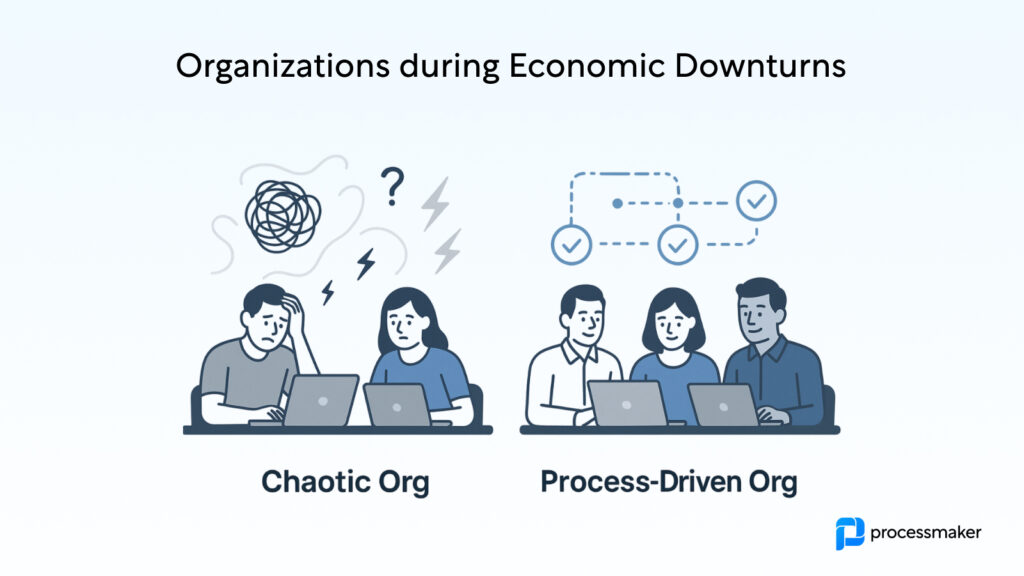
Outlasting Competitors During Recessions
Downturns are not just about survival—they reset competitive landscapes. Research shows that companies that invest in process improvement and lean operations during downturns emerge stronger, often capturing market share as conditions improve.
By using ProcessMaker to continuously improve and automate processes, organizations create long-term efficiency gains, strengthen workforce stability, and prepare for rapid acceleration when the economy rebounds.
Action Steps for Leaders in Fiscal Planning Cycles
As organizations enter fiscal planning, leaders should prioritize process management as a resilience strategy. Key actions include:
- Invest in process discipline now. Building efficiency before a crisis creates long-term stability. ProcessMaker enables rapid deployment of automated processes without heavy IT lift.
- Measure relentlessly. Visibility and metrics enable smarter trade-offs—an area where ProcessMaker’s reporting tools provide clear insights.
- Empower people with clarity. Strong processes reduce stress and increase accountability. ProcessMaker helps standardize workflows so employees know exactly how work gets done.
- Use downturns as catalysts. Process discipline transforms constraints into competitive opportunities, especially when supported by platforms like ProcessMaker that scale automation across the enterprise.
Conclusion
In uncertain markets, process-oriented companies outperform because they treat operational discipline as a resilience engine, not a cost center. With platforms like ProcessMaker, organizations can institutionalize process excellence, withstand economic downturns, and accelerate growth when recovery begins.
FAQs
1. What does it mean to be a process-oriented company?
A process-oriented company is one that emphasizes well-documented, repeatable workflows across its operations. Instead of relying on ad hoc practices, these organizations standardize tasks, automate repetitive work, and create clear governance structures, resulting in efficiency, consistency, and scalability.
2. Why do process-oriented companies outperform during recessions?
Because they already operate lean and efficiently, process-oriented companies can adjust more strategically during downturns. They avoid waste, make data-driven decisions, and continue to fund innovation while competitors are forced to cut deeply.
3. How does process automation help in economic downturns?
Process automation reduces manual work, eliminates errors, and provides visibility into workflows. Platforms like ProcessMaker enable companies to automate approvals, manage resources, and monitor KPIs in real time, making it easier to adapt quickly when market conditions change.
4. What role does culture play in process-driven resilience?
Clear processes reduce uncertainty for employees, ensuring they know their roles and responsibilities. This boosts morale, retention, and productivity during stressful times. A stable culture, built on process discipline, helps organizations maintain performance even with fewer resources.
